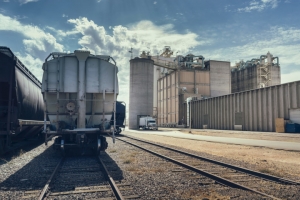


(Posted on 27/04/22)
The National Grain and Feed Association (NGFA) in the USA has testified before the Surface Transportation Board (STB), listing several examples of rail service failures experienced by grain shippers across the country and outlining recommended actions for the STB.
“NGFA’s preference is to seek commercial solutions between individual rail customers and their rail carriers,” said NGFA President and CEO Mike Seyfert during his oral testimony at STB headquarters. “However, the recent rail service challenges impacting entire regions of the country have led us to the Board to seek help.”
STB Chairman Martin Oberman called for the “Urgent Issues in Freight Rail Service” hearing and directed several Class I carriers to testify on April 26-27. NGFA urged the Board to address inadequate rail service in a March 24 letter to Chairman Oberman and led another letter signed by members of the Agricultural Transportation Working Group on April 21 outlining several proposals to improve rail service.
In testimony, Seyfert listed several instances of rail service failures and their consequences, including excessive dwell time at origin and delayed train delivery at grain export destinations.
“Many NGFA members have a daily risk of slowing or shutting down operations due to reduced and inconsistent rail service,” he said. “Some individual NGFA member companies report losses and increased costs in the tens of millions of dollars and lost or reduced operating days totaling weeks.”
NGFA estimates the combined costs to the grain industry due to lost revenues and additional freight expenses in the first quarter of 2022 to be over $100 million. “Depending on the market position of the grain industry participant, these extra transportation costs are either borne by the participant, reflected in the grain basis paid to the farmer, or passed onto the consumer,” Seyfert noted.
One of NGFA’s recommendations for STB is to implement financial incentives for railroads to perform more efficiently using the same concepts they use to incentivize their customers.
While NGFA member companies understand the pandemic caused labor shortages for employers in many industries, the Class I railroads’ inadequate crews are having an undue impact on grain shippers and receivers, NGFA noted. For example: “When NGFA members cannot load a train because a crew is out with COVID, they will be charged demurrage by the rail line and if they cannot unload a train due to COVID, they will pay demurrage and face the risk of penalties or loss of contracts with their own customer,” Seyfert said. “However, if the railroad cannot deliver or move a train due to COVID – or any other reason – NGFA members cannot charge and are not entitled to any demurrage from the railroad.”
ADM and Mitsubishi Corporation have signed a non-binding memorandum of understanding to form a strategic... Read more
ESL Shipping and global steel manufacturer SSAB have agreed on a multi-year extension of the agreement... Read more
Anglo American’s Sakatti copper and polymetallic project in Finland has been designated as a &... Read more
FEFAC, representing the EU compound feed and premix manufacturers, noted with deep concern the announced... Read more
Catering to the growing demand from India’s confectionery, infant formula, and dairy sectors,... Read more
Khalifa Economic Zones Abu Dhabi – KEZAD Group, the largest operator of integrated and purpose... Read more
Rio Tinto will invest $1.8 billion1 to develop the Brockman Syncline 1 mine project (BS1), extending... Read more
Catherine Cobden, President and CEO of the Canadian Steel Producers Association (CSPA), has released... Read more
Enough domestic ferrous scrap is available for electric arc furnace (EAF) steelmakers to supply nearly... Read more
Cargill’s Ocean Transportation business and leading tanker shipping company, Hafnia, have joined... Read more